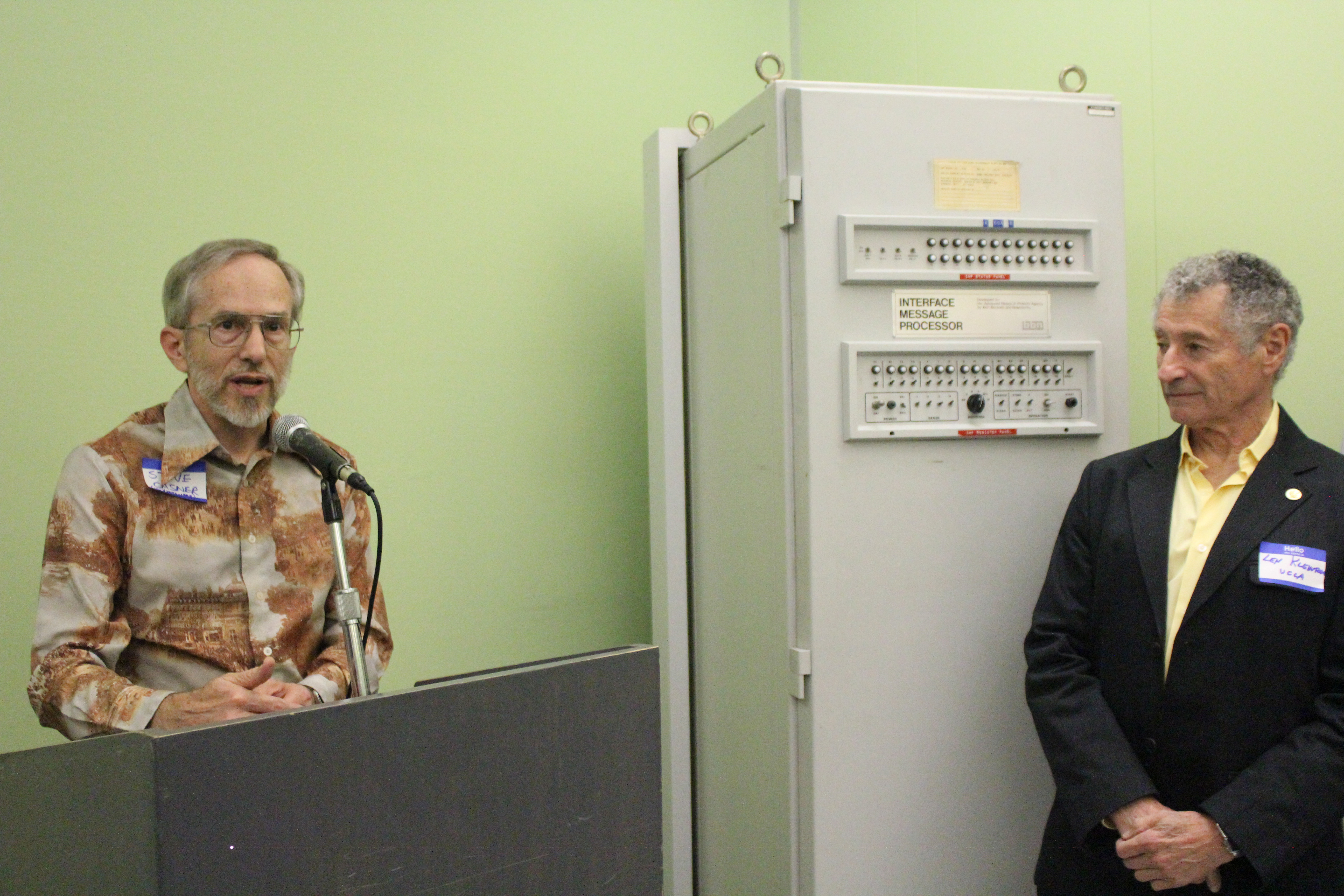UCLA celebrates birth of the Internet

Kleinrock explains the history of the creation of the Internet, and invited speakers.
By Stephen Stewart
Oct. 31, 2011 2:54 a.m.
A tall, rectangular, 800-pound Interface Message Processor stood out against the retro-style lime green walls.
Leonard Kleinrock, a distinguished UCLA computer science professor, stood at the door of the room and shook people’s hands as they took photographs with him next to the IMP. Kleinrock’s research in packet switching, a method of data transmission, made the creation of the Internet possible. The IMP was the machine he used in 1969 to send the first Internet message all the way from UCLA to Stanford.
Forty-two years after sending the message from that room, Kleinrock stood there again for the grand opening of the Kleinrock Internet Heritage Site and Archive on Saturday afternoon.
In this room, Boelter Hall 3420, the IMP and other equipment were used to send the first Internet message. It’s been painted to look just as it had that day in 1969, hence the lime green walls.
“(The IMP) should stay here, where it served its life,” Kleinrock said. “Now it’s come to be recognized.”
The archive was created to inform the public about the Internet’s first message, said Brad Fidler, director of the Kleinrock Internet Heritage Site and Archive. Besides professors, many people had forgotten the first Internet message was sent from UCLA, Fidler said.
Kleinrock donated the IMP to the archive after years of keeping it stored in various places in Boelter Hall when it was no longer used.
“It required some diligence or it would have disappeared,” Kleinrock said. Denoting its special significance, Kleinrock continued, “I made sure it was put aside.”
He also donated many of his research papers to this cause, which related to the sending of the first Internet message.
Because of his pioneering work on the Internet and his donation of research papers, Fidler named the archive after Kleinrock.
While the archive’s hours have not been set yet, they will be made available soon, Fidler said. The archive will be open based on the demand of the public, he added.
UCLA students, Los Angeles locals and other early pioneers in the Internet field attended the event. Amber Nicholson, a fourth-year chemical engineering student, said she came to see a part of Internet history.
“We got to shake (Kleinrock’s) hand,” Nicholson said. “To be able to walk into the room and hear about the first message is definitely a story I’ll tell my grandkids.”
One visitor, Victoria Bernal, heard about the event through Twitter.
The Echo Park resident said she wanted to learn about the Internet and its relationship to the history of Los Angeles, as well as to UCLA.
“I like hearing about the human side,” Bernal said.
During the event, Kleinrock told visitors the story of how he and then-UCLA graduate student Charley Kline sent the message to Stanford on Oct. 29, 1969.
In the middle of the message, the Stanford computer crashed, leaving the message incomplete at “lo,” instead of the intended “login.”
“The message was short, biblical and accidental,” Kleinrock said. “Lo and behold. Nothing like what God hath wrought.”
The only recording of the message was left on a log book, detailing merely that the IMP spoke to the processor in Stanford.
At the time, Kleinrock only expected the Internet to become a form of utility or infrastructure, he said.
“Now I realize that it’s about communities of people,” Kleinrock said. “I never thought it would reach out to the common man, (or even) my 99-year-old mother or my 8-and-a-half-year-old granddaughter.”
Love internet history? View the 1969 announcement of UCLA’s role as the “first station in a nationwide computer network” by clicking here.


